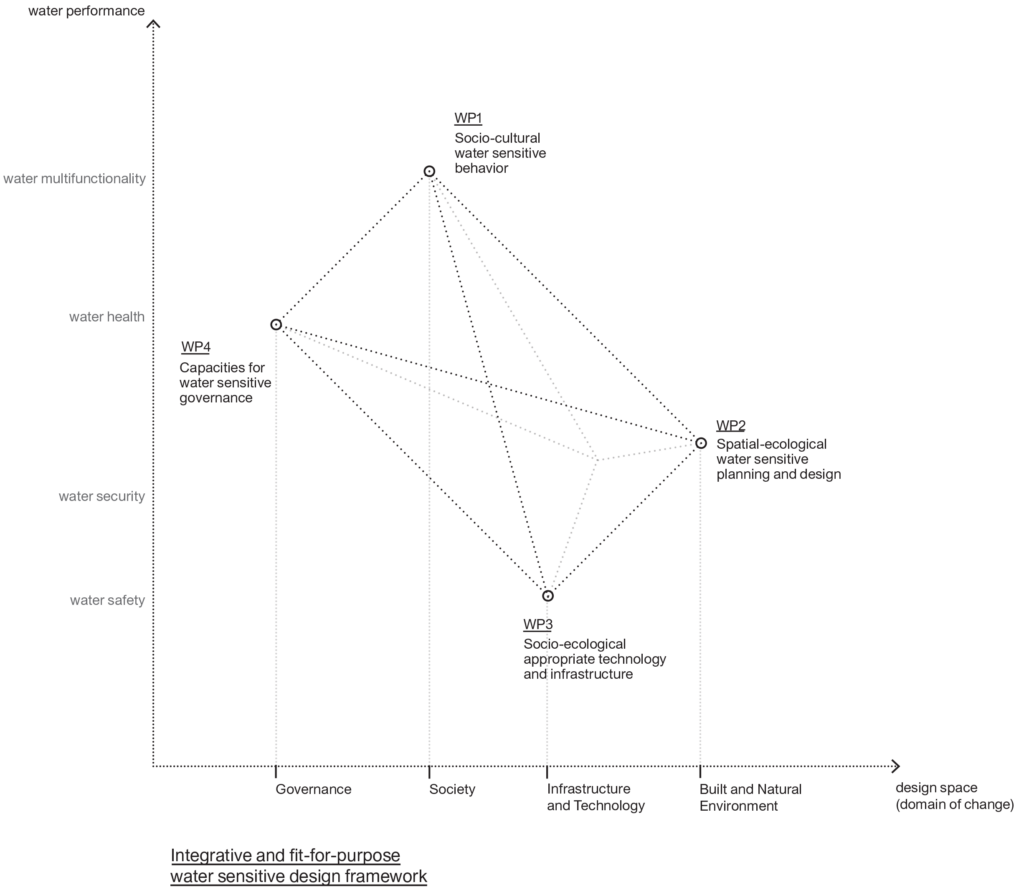Ambition
The Water4Change research programme aims to contribute to transitions towards water sensitive Indian cities by delivering an impact pathway for water security, climate change adaptation, reduction of safety costs and enhancement of human and environmental health, wellbeing and social cohesion.
Key outputs:
- – Water Sensitive City Framework: analytical and procedural strategy for co-producing transitions in any Indian city
- – Fit-for-purpose guidelines: customised pathways and strategies to accelerate transitions in three case study cities
Theory of Change and Impact Pathway
The core objective of Water4Change (W4C) Programme is to provide communities, city, regional and national authorities, non-governmental organizations and operators an integrative, fit-for-purpose and context-sensitive water sensitive design framework for livable fast-growing secondary cities in India in a co-creative manner. The impact targeted by the project is to contribute to the transitionto a water-sensitive city (WSC) in the long-term. Ultimately, the aim is to facilitate long-term sustainability, equality and resilience of urban water systems by delivering an impact pathway for water security, climate change adaptation, reduction of safety costs and enhancement of human and environmental health, wellbeing and social cohesion in fast-growing secondary cities in India. The W4C framework co-created in the 3 cities will assist the incremental and adaptive implementation of WSC vision at a range of scales, strategically guiding short-term actions and long-term land-use planning and infrastructure investments for greater livability and equal share of benefits between society, environment and economy.
To achieve this impact, W4C integrates in a holistic fashion a water sensitive city vision with transition management for adaptive governance in a design framework for prototyping and implementing, in time and space, a smart combination of solutions based on available technology, societal preferences, policy options and governance capacities. Society, Built and Natural Environment, Infrastructure and Technology, and Governance are key realms that in a reciprocal combination determine the ability to successfully deliver sustainable change. Building on profoundly co-creative processes between the researchers of the consortium and local stakeholders in the case study cities, the programme is unique in understanding the evolving conditions, constraints and opportunities posed by these realms and determining applicability of solutions and their future change. Drawing on the different steps of the transition management framework, the programme output starts by systemically understanding the spatial, ecological, economic and socio-cultural dynamics, existing technologies and infrastructure, relevant water policies and governance capacities. In a next step, the vision for a water sensitive city will be explored together with the stakeholders in the local contexts and in relation to the different dimensions of society, environment, technology, and governance. Finally, through the identification of opportunities, short-term urgencies and long-term uncertainties for adaptation and gaps in linking the present situation to the long-term vision, innovative technologies and policies will be identified and capacities for water sensitive governance will be developed to ensure the implementation of site-specific and culturally embedded actions.
Water4Change framework is locally attuned to place-based objectives in three W4C pilot cities – (1) Bhuj, Gujarat – (2) Bhopal, Madhya Pradesh – (3) Kozhikode, Kerala. The profoundly co-creative processes of addressing the four themes for shifting towards a water sensitive city ensures that the outputs of the research are highly integrative. In addition, the co-creation of research outputs with stakeholders will contribute to achieving the outcome and contributing to the impact in line with our identified impact pathway. Relevant outcome dimensions to achieve the impact of supporting the transition towards a water sensitive city involve changing user behaviours, new institutional and knowledge conditions for short- and long-term adaptation and transformative practices building synergies across systems, scales and subjects.
Lessons learned from the 3 cities are used towards a learning matrix for knowledge sharing of approaches across India alongside with considerations regarding their upscaling and applicability in other countries. In addition to this knowledge transfer across cities, the programme also includes several internal learning and reflection loops within Work Packages to ensure that the results are in line with local needs and that they indeed are taken up to address local challenges and make use of opportunities.
A theory of change encompasses the following elements to develop the impact pathway (Vogel 2012; Stein and Valters 2012; Oberlack et al. 2019):
- – Problem definition: the problem area to be addressed, including social, political and environmental conditions, (knowledge-related) causes to the problem and actors able to influence change;
- – Impact: long-term change in social, economic and environmental conditions that the initiative seeks to support and for whose ultimate benefit;
- – Outcome: the changes in understanding, thinking, behaviour, relationships, policies, interventions, practices and capacities of stakeholders, resulting from exchange of knowledge and the uptake of research output;
- – Outputs: the direct and immediate activities conducted and insights obtained by a research project or programme that lead to intended outcomes.
Water Sensitive Design Framework
In W4C programme, Water Sensitive Design Framework is an integrated perspective based on visions for water sensitive cities and the conceptual approaches across four realms (society and culture, governance, built and natural environment, infrastructure and technology) to give guidance to cities of where they are and to identify possible pathways to transition to a water sensitive city and deliver the vision.
– Elements: water sensitive city concept & visions, assessment framework for four realms and interrelation, process steps for framework delivery.

Fit-for-Purpose Guidelines
In W4C programme, Fit-for-Purpose Guidelines are a way of (process) reasoning, contextualising and instrumentalising/operationalising the WSDF into different city contexts for context-specific pathways and strategies.
– Elements: process steps & tools, lessons learned, best practice examples.